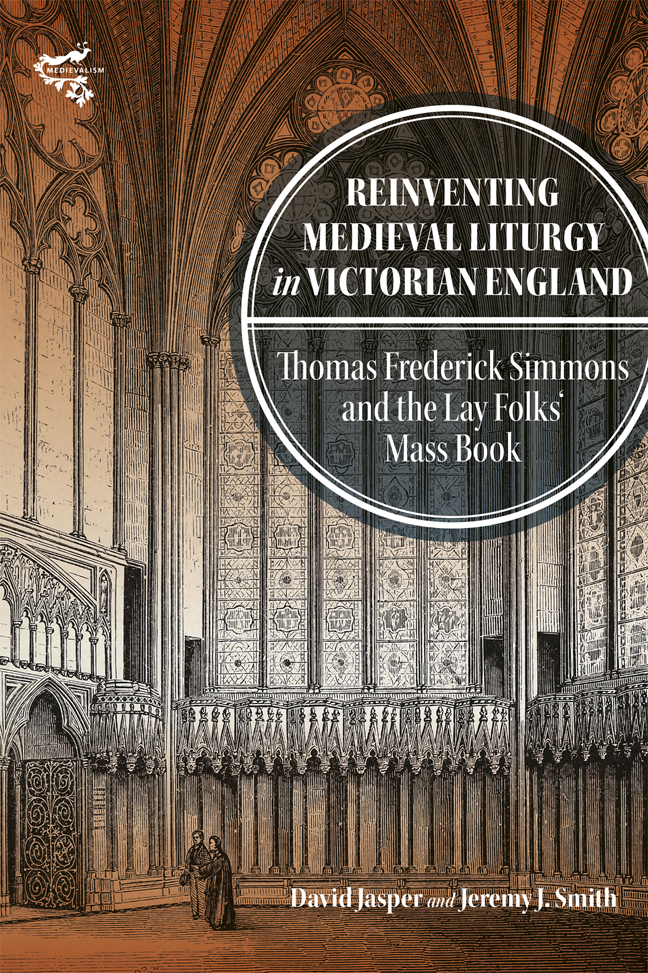 Reinventing Medieval Liturgy in Victorian England
Reinventing Medieval Liturgy in Victorian England Published online by Cambridge University Press: 02 March 2024
Thomas Frederick Simmons (1815–84)
Thomas Frederick Simmons, churchman, liturgist, and textual editor, was born in Woolwich, Kent, into a military family, the eldest son of twelve children of a captain in the Royal Artillery, another Thomas Frederick Simmons (d. 1842). The father was a prolific writer on military matters whose most successful work, running through some seven editions, was The Constitution and Practice of Courts Martial (London, 1830). Of the younger Thomas Frederick’s eight brothers, six were army officers, most notably General Sir John Lintorn Arabin Simmons (1821–1903), a highly distinguished soldier whose later appointments included governor of the Royal Arsenal and Military Academy at Woolwich, colonel-commandant of the Royal Engineers, and chief technical military adviser for the British delegation at the Congress of Berlin (1878). Another brother, Major Egbert Simmons, was killed at the Siege of Lucknow in 1857 while in temporary command of the 5th Fusiliers.
The younger Thomas Frederick was educated at Winchester College, matriculating as ‘post-master’ at Merton College, Oxford in 1832 or 1833. However, he left Merton in 1834 to pursue a career in the army, like his brothers; on 6 November 1840 a ‘Lieut. T. F. Simmons’ of the 72 Foot not only obtained a Certificate of Qualification from the Royal Military College at Sandhurst but was also commended with two others for:
having extended their acquirements into the highest branches of Mathematical Science, farther than any Officers had ever done before them at the Institution, the Board marked their sense of the very superior merits and talents of the three, by awarding them all the highest Class of Certificate of Qualification which had ever been given at the College.
Simmons seems to have been a successful soldier, becoming like his father a specialist on legal procedures in the military, although before the Crimean War (1853–56) graduates from the College, being ‘experts’, seem to have been discriminated against by the more gentlemanly officers who achieved rank through purchase. Nevertheless, although he left the army and later returned to Oxford and eventually a career in the church, graduating from Worcester College with a BA in 1848 and supplicating for his MA in 1859, Simmons never lost his interest in army matters.
To save this book to your Kindle, first ensure no-reply@cambridge.org is added to your Approved Personal Document E-mail List under your Personal Document Settings on the Manage Your Content and Devices page of your Amazon account. Then enter the ‘name’ part of your Kindle email address below. Find out more about saving to your Kindle.
Note you can select to save to either the @free.kindle.com or @kindle.com variations. ‘@free.kindle.com’ emails are free but can only be saved to your device when it is connected to wi-fi. ‘@kindle.com’ emails can be delivered even when you are not connected to wi-fi, but note that service fees apply.
Find out more about the Kindle Personal Document Service.
To save content items to your account, please confirm that you agree to abide by our usage policies. If this is the first time you use this feature, you will be asked to authorise Cambridge Core to connect with your account. Find out more about saving content to Dropbox.
To save content items to your account, please confirm that you agree to abide by our usage policies. If this is the first time you use this feature, you will be asked to authorise Cambridge Core to connect with your account. Find out more about saving content to Google Drive.